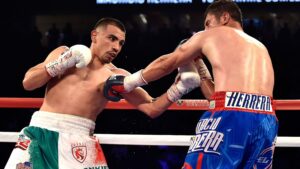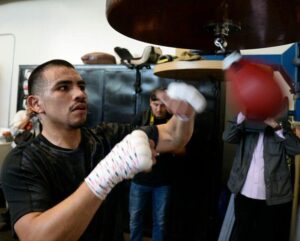“The saddest thing in life is wasted talent,” opined Robert De Niro in his film ‘A Bronx Tale’. On May 7th, 2016, on the undercard of Canelo Alvarez’s middleweight title defence against Amir Khan, a prospect from East LA was making his name as potentially the city’s next boxing superstar.
His name was Frankie Gomez, who, in registering a comprehensive decision victory over the former world title challenger Mauricio Herrera, extended his record to 21-0 and staked his claim for a welterweight title opportunity in the near future.

Despite flattering to deceive somewhat in several of his performances, Gomez was regarded as a bonafide blue-chip prospect with a competitive quality so strong that even his trainer Freddie Roach was reputedly wary of pitting him against his prized possession Manny Pacquiao in sparring sessions, lest his star pupil get too beaten up before one of his big fights.
“It feels good to get this victory,” the then-24 year-old Californian declared after beating Herrera. “I’m ready to take on my next challenge and take on the best.” He has not fought since.
Gomez has virtually disappeared from the boxing world while fans have taken to speculating on his whereabouts, with pictures of the former fighter occasionally surfacing on the internet.

Boxing is a tough sport, and it is certainly understandable that someone might think that there are easier ways of making a living. However, for someone of Gomez’s ability – God-given, according to many of his fans – boxing should have been more than just mere vocation. Rather, it should have been seen as a real chance to make history for his family and his city in the post-Mayweather era in one of boxing’s most lucrative divisions.
Some might also argue that the saddest thing in sports is wasted talent, too.
Indeed, the notion of a mercurial underachiever or flawed genius, periodically showing flashes of brilliance but never quite fulfilling their early promise, has now become an almost romantic trope across sports.

Whether Gomez – someone who consistently fluctuated between welterweight and light-welterweight throughout his career – meets that definition is up for debate. Ultimately, if he has given the sport up for good, one would hope that it is for more meaningful pursuits and in years to come, he will not be ruminating regretfully on what might have been.
Article by: Navi Singh
Follow Navi on Twitter at: @DarkMan________